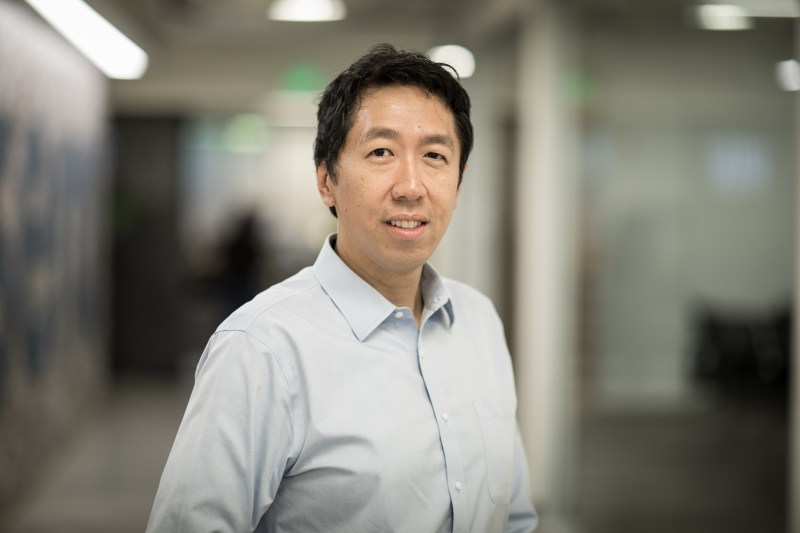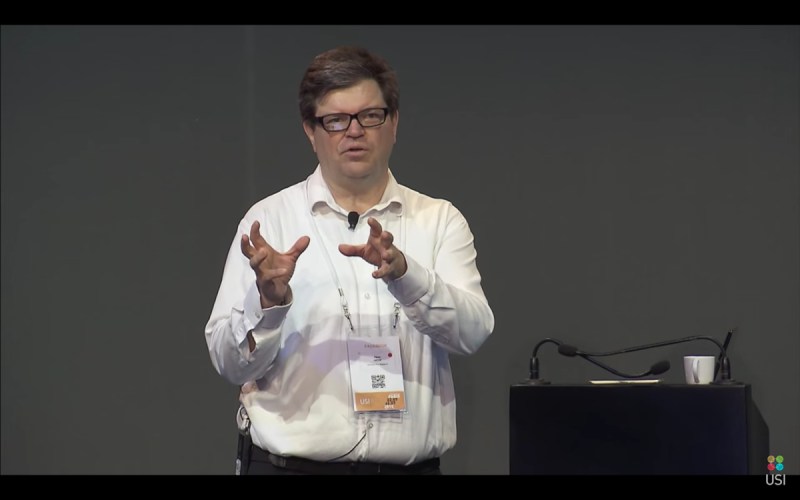testsetset
Artificial intelligence is cast all at once as the technology that will save the world and end it.
To cut through the noise and hype, VentureBeat spoke with luminaries whose views on the right way to do AI have been informed by years of working with some of the biggest tech and industry companies on the planet.
Below find insights from Google Brain cofounder Andrew Ng, Cloudera general manager of ML and Fast Forward Labs founder Hilary Mason, Facebook AI Research founder Yann LeCun, and Accenture’s responsible AI global lead Dr. Rumman Chowdhury. We wanted to get a sense of what they saw as the key milestones of 2018 and hear what they think is in store for 2019.
Amid a recap of the year and predictions for the future, some said they were encouraged to be hearing fewer Terminator AI apocalypse scenarios, as more people understand what AI can and cannot do. But these experts also stressed a continued need for computer and data scientists in the field to adopt responsible ethics as they advance artificial intelligence.
June 5th: The AI Audit in NYC
Join us next week in NYC to engage with top executive leaders, delving into strategies for auditing AI models to ensure fairness, optimal performance, and ethical compliance across diverse organizations. Secure your attendance for this exclusive invite-only event.

Dr. Rumman Chowdhury
Dr. Rumman Chowdhury is managing director of the Applied Intelligence division at Accenture and global lead of its Responsible AI initiative, and was named to BBC’s 100 Women list in 2017. Last year, I had the honor of sharing the stage with her in Boston at Affectiva’s conference to discuss matters of trust surrounding artificial intelligence. She regularly speaks to audiences around the world on the topic.
For the sake of time, she responded to questions about AI predictions for 2019 via email. All responses from the other people in this article were shared in phone interviews.
Chowdhury said in 2018 she was happy to see growth in public understanding of the capabilities and limits of AI and to hear a more balanced discussion of the threats AI poses — beyond fears of a global takeover by intelligent machines as in The Terminator. “With that comes increasing awareness and questions about privacy and security, and the role AI may play in shaping us and future generations,” she said.
Public awareness of AI still isn’t where she thinks it needs to be, however, and in the year ahead Chowdhury hopes to see more people take advantage of educational resources to understand AI systems and be able to intelligently question AI decisions.
She has been pleasantly surprised by the speed with which tech companies and people in the AI ecosystem have begun to consider the ethical implications of their work. But she wants to see the AI community do more to “move beyond virtue signaling to real action.”
“As for the ethics and AI field — beyond the trolley problem — I’d like to see us digging into the difficult questions AI will raise, the ones that have no clear answer. What is the ‘right’ balance of AI- and IoT-enabled monitoring that allows for security but resists a punitive surveillance state that reinforces existing racial discrimination? How should we shape the redistribution of gains from advanced technology so we are not further increasing the divide between the haves and have-nots? What level of exposure to children allows them to be ‘AI natives’ but not manipulated or homogenized? How do we scale and automate education using AI but still enable creativity and independent thought to flourish?” she asked.
In the year ahead, Chowdhury expects to see more government scrutiny and regulation of tech around the world.
“AI and the power that is wielded by the global tech giants raises a lot of questions about how to regulate the industry and the technology,” she said. “In 2019, we will have to start coming up with the answers to these questions — how do you regulate a technology when it is a multipurpose tool with context-specific outcomes? How do you create regulation that doesn’t stifle innovation or favor large companies (who can absorb the cost of compliance) over small startups? At what level do we regulate? International? National? Local?”
She also expects to see the continued evolution of AI’s role in geopolitical matters.
“This is more than a technology, it is an economy- and society-shaper. We reflect, scale, and enforce our values in this technology, and our industry needs to be less naive about the implications of what we build and how we build it,” she said. For this to happen, she believes people need to move beyond the idea common in the AI industry that if we don’t build it, China will, as if creation alone is where power lies.
“I hope regulators, technologists, and researchers realize that our AI race is about more than just compute power and technical acumen, just like the Cold War was about more than nuclear capabilities,” she said. “We hold the responsibility of recreating the world in a way that is more just, more fair, and more equitable while we have the rare opportunity to do so. This moment in time is fleeting; let’s not squander it.”
<pOn a consumer level, she believes 2019 will see more use of AI in the home. Many people have become much more accustomed to using smart speakers like Google Home and Amazon Echo, as well as a host of smart devices. On this front, she’s curious to see if anything especially interesting emerges from the Consumer Electronics Show — set to kick off in Las Vegas in the second week of January — that might further integrate artificial intelligence into people’s daily lives.
“I think we’re all waiting for a robot butler,” she said.

Andrew Ng
I always laugh more than I expect to when I hear Andrew Ng deliver a whiteboard session at a conference or in an online course. Perhaps because it’s easy to laugh with someone who is both passionate and having a good time.
Ng is an adjunct computer science professor at Stanford University whose name is well known in AI circles for a number of different reasons.
He’s the cofounder of Google Brain, an initiative to spread AI throughout Google’s many products, and the founder of Landing AI, a company that helps businesses integrate AI into their operations.
He’s also the instructor of some of the most popular machine learning courses on YouTube and Coursera, an online learning company he founded, and he founded deeplearning.ai and wrote the book Deep Learning Yearning.
After more than three years there, in 2017 he left his post as chief AI scientist for Baidu, another tech giant that he helped transform into an AI company.
Finally, he’s also part of the $175 million AI Fund and on the board of driverless car company Drive.ai.
Ng spoke with VentureBeat earlier this month when he released the AI Transformation Playbook, a short read about how companies can unlock the positive impacts of artificial intelligence for their own companies.
One major area of progress or change he expects to see in 2019 is AI being used in applications outside of tech or software companies. The biggest untapped opportunities in AI lie beyond the software industry, he said, citing use cases from a McKinsey report that found that AI will generate $13 trillion in GDP by 2030.
“I think a lot of the stories to be told next year [2019] will be in AI applications outside the software industry. As an industry, we’ve done a decent job helping companies like Google and Baidu but also Facebook and Microsoft — which I have nothing to do with — but even companies like Square and Airbnb, Pinterest, are starting to use some AI capabilities. I think the next massive wave of value creation will be when you can get a manufacturing company or agriculture devices company or a health care company to develop dozens of AI solutions to help their businesses.”
Like Chowdhury, Ng was surprised by growth in understanding in what AI can and cannot do in 2018, and pleased that conversations can take place without focusing on the killer robot scenario or fear of artificial general intelligence.
Ng said he intentionally responded to my questions with answers he didn’t expect many others to have.
“I’m trying to cite deliberately a couple of areas which I think are really important for practical applications. I think there are barriers to practical applications of AI, and I think there’s promising progress in some places on these problems,” he said.
In the year ahead, Ng is excited to see progress in two specific areas in AI/ML research that help advance the field as a whole. One is AI that can arrive at accurate conclusions with less data, something called “few shot learning” by some in the field.
“I think the first wave of deep learning progress was mainly big companies with a ton of data training very large neural networks, right? So if you want to build a speech recognition system, train it on 100,000 hours of data. Want to train a machine translation system? Train it on a gazillion pairs of sentences of parallel corpora, and that creates a lot of breakthrough results,” Ng said. “Increasingly I’m seeing results on small data where you want to try to take in results even if you have 1,000 images.”
The other is advances in computer vision referred to as “generalizability.” A computer vision system might work great when trained with pristine images from a high-end X-ray machine at Stanford University. And many advanced companies and researchers in the field have created systems that outperform a human radiologist, but they aren’t very nimble.
“But if you take your trained model and you apply it to an X-ray taken from a lower-end X-ray machine or taken from a different hospital, where the images are a bit blurrier and maybe the X-ray technician has the patient slightly turned to their right so the angle’s a little bit off, it turns out that human radiologists are much better at generalizing to this new context than today’s learning algorithms. And so I think interesting research [is on] trying to improve the generalizability of learning algorithms in new domains,” he said.

Yann LeCun
Yann LeCun is a professor at New York University, Facebook chief AI scientist, and founding director of Facebook AI Research (FAIR), a division of the company that created PyTorch 1.0 and Caffe2, as well as a number of AI systems — like the text translation AI tools Facebook uses billions of times a day or advanced reinforcement learning systems that play Go.
LeCun believes the open source policy FAIR adopts for its research and tools has helped nudge other large tech companies to do the same, something he believes has moved the AI field forward as a whole. LeCun spoke with VentureBeat last month ahead of the NeurIPS conference and the fifth anniversary of FAIR, an organization he describes as interested in the “technical, mathematical underbelly of machine learning that makes it all work.”
“It gets the entire field moving forward faster when more people communicate about the research, and that’s actually a pretty big impact,” he said. “The speed of progress you’re seeing today in AI is largely because of the fact that more people are communicating faster and more efficiently and doing more open research than they were in the past.”
On the ethics front, LeCun is happy to see progress in simply considering the ethical implications of work and the dangers of biased decision-making.
“The fact that this is seen as a problem that people should pay attention to is now well established. This was not the case two or three years ago,” he said.
LeCun said he does not believe ethics and bias in AI have become a major problem that require immediate action yet, but he believes people should be ready for that.
“I don’t think there are … huge life and death issues yet that need to be urgently solved, but they will come and we need to … understand those issues and prevent those issues before they occur,” he said.
Like Ng, LeCun wants to see more AI systems capable of the flexibility that can lead to robust AI systems that do not require pristine input data or exact conditions for accurate output.
LeCun said researchers can already manage perception rather well with deep learning but that a missing piece is an understanding of the overall architecture of a complete AI system.
He said that teaching machines to learn through observation of the world will require self-supervised learning, or model-based reinforcement learning.
“Different people give it different names, but essentially human babies and animals learn how the world works by observing and figure out this huge amount of background information about it, and we don’t know how to do this with machines yet, but that’s one of the big challenges,” he said. “The prize for that is essentially making real progress in AI, as well as machines, to have a bit of common sense and virtual assistants that are not frustrating to talk to and have a wider range of topics and discussions.”
For applications that will help internally at Facebook, LeCun said significant progress toward self-supervised learning will be important, as well as AI that requires less data to return accurate results.
“On the way to solving that problem, we’re hoping to find ways to reduce the amount of data that’s necessary for any particular task like machine translation or image recognition or things like this, and we’re already making progress in that direction; we’re already making an impact on the services that are used by Facebook by using weakly supervised or self-supervised learning for translation and image recognition. So those are things that are actually not just long term, they also have very short term consequences,” he said.
In the future, LeCun wants to see progress made toward AI that can establish causal relationships between events. That’s the ability to not just learn by observation, but to have the practical understanding, for example, that if people are using umbrellas, it’s probably raining.
“That would be very important, because if you want a machine to learn models of the world by observation, it has to be able to know what it can influence to change the state of the world and that there are things you can’t do,” he said. “You know if you are in a room and a table is in front of you and there is an object on top of it like a water bottle, you know you can push the water bottle and it’s going to move, but you can’t move the table because it’s big and heavy — things like this related to causality.”

Hilary Mason
After Cloudera acquired Fast Forward Labs in 2017, Hilary Mason became Cloudera’s general manager of machine learning. Fast Forward Labs, while absorbed into Cloudera, is still in operation, producing applied machine learning reports and advising customers to help them see six months to two years into the future.
One advancement in AI that surprised Mason in 2018 was related to multitask learning, which can train a single neural network to apply multiple kinds of labels when inferring, for example, objects seen in an image.
Fast Forward Labs has also been advising customers on the ethical implications of AI systems. Mason sees a wider awareness for the necessity of putting some kind of ethical framework in place.
“This is something that since we founded Fast Forward — so, five years ago — we’ve been writing about ethics in every report but this year [2018] people have really started to pick up and pay attention, and I think next year we’ll start to see the consequences or some accountability in the space for companies and for people who pay no attention to this,” Mason said. “What I’m not saying very clearly is that I hope that the practice of data science and AI evolve as such that it becomes the default expectation that both technical folks and business leaders creating products with AI will be accounting for ethics and issues of bias and the development of those products, whereas today it is not the default that anyone thinks about those things.”
As more AI systems become part of business operations in the year ahead, Mason expects that product managers and product leaders will begin to make more contributions on the AI front because they’re in the best position to do so.
“I think it’s clearly the people who have the idea of the whole product in mind and understand the business understand what would be valuable and not valuable, who are in the best position to make these decisions about where they should invest,” she said. “So if you want my prediction, I think in the same way we expect all of those people to be minimally competent using something like spreadsheets to do simple modeling, we will soon expect them to be minimally competent in recognizing where AI opportunities in their own products are.”
The democratization of AI, or expansion to corners of a company beyond data science teams, is something that several companies have emphasized, including Google Cloud AI products like Kubeflow Pipelines and AI Hub as well as advice from the CI&T consultancy to ensure AI systems are actually utilized within a company.
Mason also thinks more and more businesses will need to form structures to manage multiple AI systems.
Like an analogy sometimes used to describe challenges faced by people working in DevOps, Mason said, managing a single system can be done with hand-deployed custom scripts, and cron jobs can manage a few dozen. But when you’re managing tens or hundreds of systems, in an enterprise that has security, governance, and risk requirements, you need professional, robust tooling.
Businesses are shifting from having pockets of competency or even brilliance to having a systematic way to pursue machine learning and AI opportunities, she said.
The emphasis on containers for deploying AI makes sense to Mason, since Cloudera recently launched its own container-based machine learning platform. She believes this trend will continue in years ahead so companies can choose between on-premise AI or AI deployed in the cloud.
Finally, Mason believes the business of AI will continue to evolve, with common practices across the industry, not just within individual companies.
“I think we will see a continuing evolution of the professional practice of AI,” she said. “Right now, if you’re a data scientist or an ML engineer at one company and you move to another company, your job will be completely different: different tooling, different expectations, different reporting structures. I think we’ll see consistency there,” she said.
Updated 7 pm Jan. 2 Correction: The original version of this article mistakenly said Andrew Ng is on the board of Fast.ai when in fact he is on the board of autonomous driving company Drive.ai. We regret any inconvenience this may have caused.


